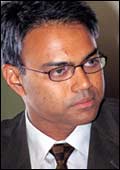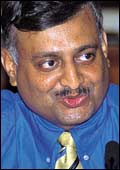 |
| BT-Gartner round table: (Clockwise from
left) Dion Wiggins, Research Director, (China); Debashish Sinha,
Principal Analyst, Gartner Research; Rita Terdiman, Director,
Offshore Services (US); Bob Hayward, SVP, Research Fellow (APAC
& Japan); Partha Iyengar, Research VP (India); BT's Priya
Srinivasan; Craig Baty, Group VP & Chief of FResearch, Global
IT Management, APAC & Australia |
Looking
for a fresh angle on the China versus India issue in it Services?
Research and consultancy firm Gartner may just have one. In an exclusive
round table discussion with BT at the recently held Gartner Summit
in Mumbai, the firm's leading analysts for it services and BPO deliberated
on a range of issues, right from India's competitors in it and BPO
to the impact of the BPO boom on the Indian economy, the future
of Indian it and finally the shape of things to come in the world
of offshoring and global delivery platforms. The participants were:
Bob Hayward, SVP, Research Fellow (APAC & Japan); Debashish
Sinha, Principal Analyst, Gartner Research; Rita Terdiman, Director,
Offshore Services (US); Craig Baty, Group VP & Chief of Research
Global it Management (APAC & Australia); Dion Wiggins, Research
Director, (China); Partha Iyengar, Research VP (India). Excerpts:
Business Today: Could Bob, Debashish
and Rita begin by giving us a brief overview of where they see Indian
IT and BPO in 2008?
 |
"In five years time, Indian it
services companies will be more global and tier-one''
Bob Hayward,
SVP (Research Fellow), APAC & Japan |
Bob Hayward: I don't claim to be a domain
expert, but I think in five years time Indian it services companies
will be more in the tier-one league, more global than they are today,
and will have more global flavour rather than being so India-centric.
People will think less of them as Indian companies and more as global
providers of it services. They will be quite active in China by
then and China will be the launch pad into other parts of the region.
They will also be more established in other parts like Australia
and perhaps Japan, through their China subsidiaries. Their operations
will be much larger than what they are today. It will be competitive,
their margins may not be what they are today, their growth rates
may not be what they are today, but they will still be successful
companies, and I want to stress that point because the media in
India have a great ability to convert a silver lining into a dark
cloud. I know this is a strong comment, but I think India's single
largest problem is a very negative media. Hopefully, this will also
change in the next five years.
Craig Baty: I feel the reasons for this
are quite deep. Travelling across the region, I find developing
countries actually go through a phase where they can't believe they
are so successful. I mean Japan was incredibly successful for decades,
but Japanese children were constantly told 'we are poor, we are
a poor nation' and yet they were driving Mercedes and Rolls-Royces
and had Louis Vuitton shops. India is also going through a phase
that Singapore went through and Australia went through-'we're successful,
but we are not used to it and we can't deal with it' and so they
are negative about it. It's a cultural thing but it will take the
media to turn that attitude around.
 |
"The market is consolidating at the
top and the big guys are going to get bigger"
Rita Terdiman,
Director (Offshore Services), US |
BT: Point taken. Going back to the question,
Rita, how do you think the Indian it services landscape will look
in 2008?
Rita Terdiman: The vendors that you will see in 2008 are
likely to be quite different from the current crop of vendors. They
will be the tier-one global service providers, two or three will
be Indian heritage vendors, although at that point they will be
called global vendors. Today, there are hundreds of smaller Indian
firms, but the market is consolidating at the top and the big guys
are going to get bigger.
Debashish Sinha: We just had a meeting
with TCS and they plan to be among the top 10 global it services
players by 2010. That means they would have to be a $11 billion
(Rs 50,995 crore) company by then.
Craig Baty: One thing we haven't mentioned
is that Indian companies have been in the habit of winning business
that just comes to them. You win the business, put some people on
it and sell and now we are going through this recession where Indian
companies are actually being forced to adopt real go-to market strategies.
I've spoken to three companies in the last two days and they've
all come and said hey, we have good brands, how do we deal with
analysts? How do we deal with media? How do we develop a go-to market
strategy? How do we do M&A? How do we go about partnering? Help
us design the marketing department. They've never had to do most
of these things in the past. They have had departments looking into
things like sales, but very few Indian companies can compete with
an EDS or IBM in the pure power of marketing and strategy. It's
been an order-taking business so far for Indian companies as opposed
to market generation and that has got to change.
 |
"It's been an order-taking business
so far for Indian companies''
Craig Baty,
Group VP & Chief of Research, Global IT Management, APAC & Australia |
BT: On growth rates for it services and
BPO, can we have some numbers?
Partha Iyengar: In 2007, the growth for Indian it services
projected is 29 per cent, CAGR between 2002 and 2007, which puts
it services at about $30.1 billion (Rs 1,39,540 crore), the formal
report will be out in September, but this number is based on initial
trends.
Sinha: Today, the it services market is about $20 billion
(Rs 92,718 crore) globally, about $12-15 billion (Rs 55,630 crore-Rs
69,538 crore) comes from the US, of that India generates about $10
billion or so today. This is likely to go up over the next five
years to about $30 billion on a CAGR of between 28 and 30 per cent.
The offshore BPO market today globally is about $1.8 billion (Rs
8,344 crore), which is likely to increase to about $13.8 billion
(Rs 63,975 crore) by 2007.
BT: $13.8 billion by 2007 globally is
vastly different from the nasscom-McKinsey prediction of a $21-24
billion (Rs 97,353 crore-Rs 1,11,261 crore) BPO industry in India
alone by 2008....
Sinha: I am not quite certain what the McKinsey numbers are,
I wouldn't be surprised if they are different, the definitions could
be different. For instance, we don't include captive centres. So
no GE Capital, Amex, HSBC, etc, it's just external service providers.
This figure is just the potential for revenue based on the demand
we have been able to track. There is a lot of work that the outsourcers
need to do to generate the market from that potential and this is
a more difficult sell than it services. The Indian BPO market is
not necessarily comprised of Indian companies. I believe that about
65 per cent of the $13-odd billion will actually be global service
providers who set up Indian operations like EDS and Exult and IBM
and the rest of them and the other 35 per cent would be incumbent
services providers.
 |
"The offshore BPO market globally will
increase to $13.8 billion by 2007"
Debashish Sinha,
Principal Analyst, Gartner Research |
Hayward: Now even on this point you will
see every other country that I work with in the Asia Pacific will
consider the fact that they have foreign companies in their country
exporting to the world as an amazing success story. In fact, many
of them devote tremendous amount of effort and money to make that
happen, but in India that will be seen as a failure since they are
not Indian companies. It's totally wrong.
Sinha: I do believe, however, as a counterpoint that a lot
of the success of India as a supply base comes out of the entrepreneurialism
shown by Indian service providers, and the acceleration of the country
comes out of that unlike some of the other countries who face a
challenge because they have to get foreign investors to come in
and set up shop, which is a longer process.
BT: What about falling growth rates in the Indian information
technology services segment?
Hayward: It's totally unrealistic in any market
to assume that high margins and 50 per cent growth rates can continue.
When people start to get shocked by that, it's just a sign to me
of unsophistication. It's a normal part of market development. I
read an article just the other day that occasionally pundits in
India say that it services and BPO is not doing much for the Indian
economy since it's a very small percentage of GDP and not contributing
much to exports. I believe that you have a problem with the way
you count things. It's very easy to count a tonne of steel manufactured
and sent to China, it's hard for the Indian customs I would imagine
to measure the value of some of these deals that are being done
today. The real benefit to the economy is more significant and profound
than most people in India realise.
 |
"Our findings were very simple: China
needs India and India wants money"
Dion Wiggins,
Director (Research), China |
BT: Craig earlier alluded to the importance
of marketing and cultivating differentiators. Finally what we're
starting to acknowledge is that competition is hotting up. Could
you name the competitors-countries or companies?
Baty: The competition is individual vendors with individual
competencies no matter where they are.
BT: But there are inherent country strengths
that lend themselves to the business, right?
Terdiman: Yes, I have to slightly disagree
with Craig on this because I think that for the next two-to-three
years in the minds of the customers, it is a country choice.
Iyengar: Today's view is country over
company, but that will change as the industry matures. We track
11 countries today in the it services, BPO market with very different
risk profiles, very different capability profiles, resource availabilities.
Terdiman: On a country basis, there's
Ireland, Northern Ireland, the Philippines who have had an industry
for several years, and what you need to look at over the next few
years are a couple of characteristics-countries that have the scale
to produce an industry en masse. And the only two other countries
that can do that are China and Russia. Second thing you have to
look at is some emerging countries, since all developing countries
are looking to enter this market and want to be the next India.
 |
"Today's view is country over company,
but that will change as the industry matures"
Partha Iyengar,
VP (Research), India |
BT: Now for the all-important country
competitor question-what about China?
Dion Wiggins: We published a lot of
research early last year that was not received well in India at
all, comparing India and China. The findings were very simple: China
needs India and India wants money. We expect the opportunity for
India to be 40 per cent of the Chinese export market in four years
time. In China, by 2006, it services exports alone will go to $27
billion (Rs 1,25,169 crore). They are currently growing at 120 per
cent plus year-on-year. But it's not about competition. As Indian
companies get global, China will be another delivery location. While
salaries are comparable, the difference is in billable rates. Last
year in India, for a developer of two years experience, the standard
billable rate was $24 (Rs 1,112) an hour, for a project manager
it was $30 (Rs 1,390) an hour. In China, it was $50 (Rs 2,318) per
hour for project managers since there is a critical shortage of
project managers in China and this is where India can help and they
(the Chinese) are also weak in processes.
Hayward: We, in fact, refer to ICT not as Information and
Communication Technology, but India and China together. The combination
is powerful and scary for all other countries since you have a combination
of scale, cost arbitrage, the hardware engineering skills of Chinese,
the software skills of Indians and you can blend that into a powerful
combination. I already see a core set of hardware companies in China
using software developed in India and these companies will soon
go regional and then global. Huawei, for instance, has 900 software
engineers in Bangalore-it's a Chinese hardware company, which is
saying, we will do Indian software, Chinese hardware and go to the
world-fantastic strategy.
|
